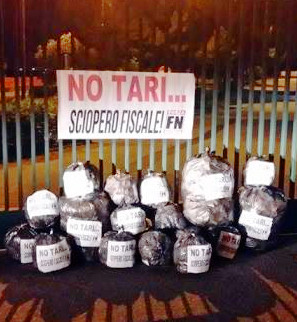Some international tax resistance news:
- Forza Nuova activists in Lamezia Terme piled trash bags at the city gates under a sign reading “No Tari — Tax Strike!” They are protesting a new tax on garbage collection.
- Twenty war tax resisters in the Canary Islands redirected €2,000 from the military to alternative projects.
- The Association of Catalan Municipalities and the Association of Municipalities for Independence are launching a campaign to get local government bodies in Catalonia to pay their federal taxes to the Catalan regional government rather than to the federal government. This is currently mostly a symbolic gesture, as the Catalan government is forwarding such payments along to the central tax administration, but the groups see this as a way of laying the groundwork for independence and as giving the regional government financial leverage in its fight. They also hope that by convincing local governments to do this they will also encourage people and businesses to follow suit.
- The Knowckers.org site has tried to tally up how much the Bonnets Rouges movement cost the French government during its successful campaign against the highway tax, and to explain the cross-ideological appeal of the movement.
- In Honduras, where most of the population works in the “underground economy,” tax evasion is an especially valuable skill. Insurgent criminal groups have infiltrated the tax agency and use the tax rolls to exact a “war tax” from people in areas they control. So if you can stay off the lists, you may avoid persecution from both the government and the insurgents. But the government is cracking down, and has also added a new criminal offense to the penal code — people who encourage, out loud or in writing, people not to pay taxes are subject to a three to six year prison term. “The question arises,” writes Jorge Colindres in El Canal, “if there is criminal liability against those who distribute copies of the writings of Henry David Thoreau or Lysander Spooner, who promoted tax resistance as a means of protest against the policies of the State.”
- Tax season has come to a close in Asturias, and for war tax resisters there it climaxed with a demonstration and blockade of the tax office in Xixón.




